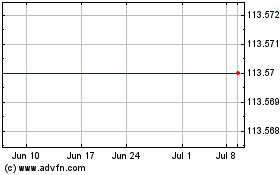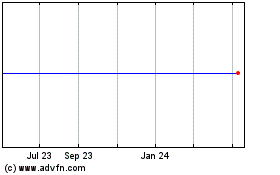Spark Therapeutics (NASDAQ:ONCE) and Pfizer Inc. (NYSE:PFE)
announced today that SPK-9001, the lead investigational candidate
in the companies' SPK-FIX program has been granted support through
the European Medicines Agency (EMA) PRIority MEdicines (PRIME)
program. According to the EMA, PRIME is intended to enhance support
for new treatments in development “that may offer a major
therapeutic advantage over existing treatments, or benefit patients
without treatment options.”
“We are pleased that investigational SPK-9001 has been granted
access to the PRIME program, which potentially will help accelerate
the delivery of this potential gene therapy to European patients
living with hemophilia B,” said Jeffrey D. Marrazzo, chief
executive officer of Spark Therapeutics. “We appreciate the EMA’s
dedication to moving treatments forward for patients who are
underserved with current options, and we look forward to our
continued collaboration on SPK-9001.”
SPK-9001 is an experimental treatment for hemophilia B that is
currently being investigated in an ongoing Phase 1/2 trial as a
potential single-dose therapy. The PRIME program provides enhanced
interaction and early dialogue with developers of promising
medicines, which is intended to optimize development plans and
speed up evaluation so these medicines can reach patients
earlier.
SPK-9001 received orphan product designation from
the U.S. Food and Drug Administration (FDA) in September 2015,
and later received breakthrough therapy designation from the FDA in
July 2016.
About Hemophilia B Hemophilia, a rare genetic
bleeding disorder that causes the blood to take a long time to clot
as a result of a deficiency in one of several blood clotting
factors, is almost exclusively in males. People with hemophilia are
at risk for excessive and recurrent bleeding from modest injuries,
which have the potential to be life threatening. People with severe
hemophilia often bleed spontaneously into their muscles or joints.
The incidence of hemophilia B is one in 25,000 male births. People
with hemophilia B have a deficiency in clotting factor IX, a
specific protein in the blood. Hemophilia B also is called
congenital factor IX deficiency or Christmas disease. Current
standard of care requires recurrent intravenous infusions of either
plasma-derived or recombinant factor IX to control and prevent
bleeding episodes. There exists a significant need for novel
therapeutics to treat people living with hemophilia. About
the SPK-FIX Program and SPK-9001 Spark
Therapeutics' proprietary technology platform for selecting,
designing, manufacturing and formulating gene therapies was applied
to developing compounds in the SPK-FIX program.
The SPK-FIX program leverages a long history of
hemophilia gene therapy research and clinical development conducted
by Spark Therapeutics and its founding scientific team over nearly
three decades. SPK-9001 is a novel, investigational
bio-engineered adeno-associated virus (AAV) capsid expressing a
codon-optimized, high-activity human factor IX variant enabling
endogenous production of factor IX. SPK-9001 is being
developed under a collaboration with Pfizer.
Spark Therapeutics and Pfizer entered into a collaboration in
December 2014 for the SPK-FIX program,
including SPK-9001, under which Spark Therapeutics is
responsible for conducting all Phase 1/2 studies for any product
candidates, while Pfizer will assume responsibility for pivotal
studies, any regulatory activities and potential global
commercialization of any products that may result from the
collaboration.
About Spark Therapeutics Spark
Therapeutics, a fully integrated company, strives to challenge the
inevitability of genetic disease by discovering, developing, and
delivering gene therapies that address inherited retinal
diseases (IRDs), neurodegenerative diseases, as well as diseases
that can be addressed by targeting the liver. Our validated
platform successfully has delivered proof-of-concept data with
investigational gene therapies in the retina and liver. Our most
advanced investigational candidate, voretigene neparvovec, in
development for the treatment of biallelic RPE65-mediated IRD, has
received orphan designations in the U.S. and European Union, and
breakthrough therapy designation in the U.S. The pipeline also
includes SPK-7001 in a Phase 1/2 trial for choroideremia, and two
hemophilia development programs: SPK-9001 (which also has received
both breakthrough therapy and orphan product designations) in a
Phase 1/2 trial for hemophilia B being developed in collaboration
with Pfizer, and SPK-8011, in a Phase 1/2 trial for hemophilia A to
which Spark Therapeutics retains global commercialization rights.
To learn more about us and our growing pipeline, visit
www.sparktx.com.
Spark Cautionary Note on Forward-looking
StatementsThis release contains "forward-looking
statements" within the meaning of the Private Securities Litigation
Reform Act of 1995, including statements regarding the company's
SPK-FIX program. Any forward-looking statements are based on
management's current expectations of future events and are subject
to a number of risks and uncertainties that could cause actual
results to differ materially and adversely from those set forth in,
or implied by, such forward-looking statements. These risks and
uncertainties include, but are not limited to, the risk that: (i)
our lead SPK-FIX product candidate, SPK-9001, may not produce
sufficient data in our Phase 1/2 clinical trial to warrant further
development; and (ii) our overall collaboration with Pfizer may not
be successful. For a discussion of other risks and uncertainties,
and other important factors, any of which could cause our actual
results to differ from those contained in the forward-looking
statements, see the "Risk Factors" section, as well as discussions
of potential risks, uncertainties and other important factors, in
our Annual Report on Form 10-K, our Quarterly Reports on Form 10-Q
and other filings we make with the Securities and Exchange
Commission. All information in this press release is as of the date
of the release, and Spark undertakes no duty to update this
information unless required by law.
Pfizer and Rare DiseaseRare disease includes
some of the most serious of all illnesses and impacts millions of
patients worldwide,[i] representing an opportunity to apply our
knowledge and expertise to help make a significant impact on
addressing unmet medical needs. The Pfizer focus on rare disease
builds on more than two decades of experience, a dedicated research
unit focusing on rare disease, and a global portfolio of multiple
medicines within a number of disease areas of focus, including
hematology, neuroscience, and inherited metabolic
disorders.[ii]
Pfizer Rare Disease combines pioneering science and deep
understanding of how diseases work with insights from innovative
strategic collaborations with academic researchers, patients, and
other companies to deliver transformative treatments and solutions.
We innovate every day leveraging our global footprint to accelerate
the development and delivery of groundbreaking medicines and the
hope of cures.
Click here to learn more about our Rare Disease portfolio and
how we empower patients, engage communities in our clinical
development programs, and support programs that heighten disease
awareness and meet the needs of patient families.
Pfizer Inc: Working together for a healthier
world®At Pfizer, we apply science and our global resources
to bring therapies to people that extend and significantly improve
their lives. We strive to set the standard for quality, safety and
value in the discovery, development and manufacture of health care
products. Our global portfolio includes medicines and vaccines as
well as many of the world's best-known consumer health care
products. Every day, Pfizer colleagues work across developed and
emerging markets to advance wellness, prevention, treatments and
cures that challenge the most feared diseases of our time.
Consistent with our responsibility as one of the world's premier
innovative biopharmaceutical companies, we collaborate with health
care providers, governments and local communities to support and
expand access to reliable, affordable health care around the world.
For more than 150 years, Pfizer has worked to make a difference for
all who rely on us. For more information, please visit us at
www.pfizer.com. In addition, to learn more, follow us on Twitter at
@Pfizer and @Pfizer_News, LinkedIn, YouTube and like us
on Facebook at Facebook.com/Pfizer.
Pfizer Disclosure Notice: The information
contained in this release is as of Feb. 28, 2017. Pfizer assumes no
obligation to update forward-looking statements contained in this
release as the result of new information or future events or
developments.
This release contains forward-looking information about SPK-9001
and the SPK-FIX program, including their potential benefits, that
involves substantial risks and uncertainties that could cause
actual results to differ materially from those expressed or implied
by such statements. Risks and uncertainties include, among other
things, the uncertainties inherent in research and development,
including the ability to meet anticipated clinical study
commencement and completion dates as well as the possibility of
unfavorable study results, including unfavorable new clinical data
and additional analyses of existing clinical data; risks associated
with initial data, including the risk that the final results of the
Phase 1/2 study for SPK-9001 and/or additional clinical trials may
be different from (including less favorable than) the initial data
results and may not support further clinical development; whether
and when any applications may be filed with regulatory authorities
for SPK-9001; whether and when regulatory authorities may approve
any such applications, which will depend on the assessment by such
regulatory authorities of the benefit-risk profile suggested by the
totality of the efficacy and safety information submitted;
decisions by regulatory authorities regarding labeling and other
matters that could affect the availability or commercial potential
of SPK-9001; and competitive developments.
A further description of risks and uncertainties can be found in
Pfizer's Annual Report on Form 10-K for the fiscal year ended
December 31, 2016 and in its subsequent reports on Form 10-Q,
including in the sections thereof captioned "Risk Factors" and
"Forward-Looking Information and Factors That May Affect Future
Results", as well as in its subsequent reports on Form 8-K, all of
which are filed with the U.S. Securities and Exchange Commission
and available at www.sec.gov and www.pfizer.com.
[i] Rare Disease: Facts and Statistics.
http://globalgenes.org/rare-diseases-facts-statistics. Accessed
September 7, 2016.
[ii] Pfizer Inc. Rare Disease.
http://www.pfizer.com/health-and-wellness/health-topics/rare-diseases/areas-of-focus.
Accessed December 20, 2016.
Investor Contact: Media Contact:
Ryan Asay Monique da Silva
Ryan.asay@sparktx.com Monique.dasilva@sparktx.com
(215) 239-6424 (215) 282-7470
Onconetix (NASDAQ:ONCE)
Historical Stock Chart
From Mar 2024 to Apr 2024

Onconetix (NASDAQ:ONCE)
Historical Stock Chart
From Apr 2023 to Apr 2024
